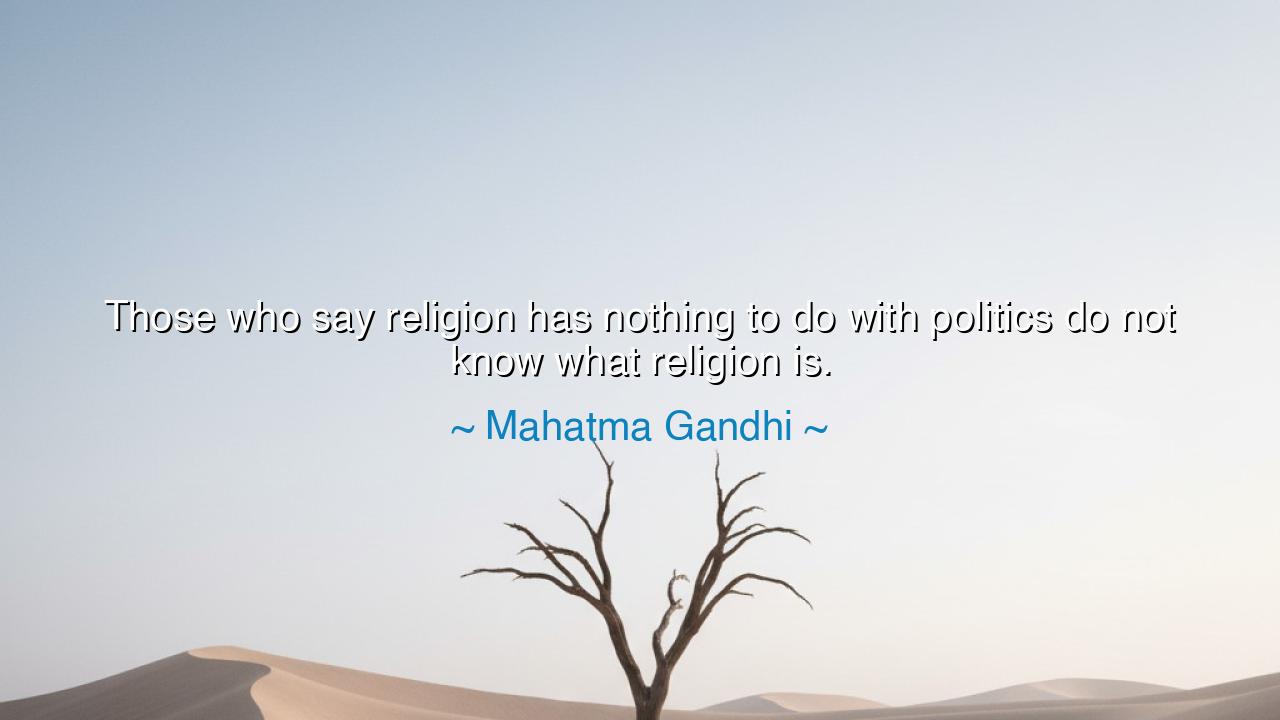
Those who say religion has nothing to do with politics do not






"Those who say religion has nothing to do with politics do not know what religion is." These powerful words by Mahatma Gandhi strike at the heart of the inseparable connection between spirituality and society. Gandhi, a man who devoted his life to both faith and social justice, understood that religion is not a private, isolated affair; it is a force that shapes morality, ethics, and the very fabric of society. To claim that religion has no place in politics is, to Gandhi, a profound misunderstanding of both the nature of faith and its potential to inspire social change. In his view, true religion is not about rituals or doctrines alone; it is a living force that governs how we treat one another and, therefore, must inevitably guide our actions in the political sphere.
The ancients understood this concept deeply. Confucius, in his teachings, saw the moral and political realms as deeply intertwined. He argued that the leader must embody virtue and integrity, principles that are rooted in religion and spiritual discipline. The ruler, in Confucian thought, was seen not just as a political figure but as a moral guide for society, someone whose personal virtue would set the tone for the state. This reflects Gandhi's sentiment: that religion—understood as a moral and ethical system—must influence all aspects of life, including governance. For Confucius, to separate ethics from politics was to risk the very stability of society itself.
In the life of Socrates, we also find a deep intersection of religion and politics, though the terms might not have been the same in his time. Socrates was brought to trial and sentenced to death by the Athenian state, partly because of his philosophical beliefs, which challenged the traditional religious views of Athens. Socrates’ teachings about the nature of virtue and justice questioned the very moral foundations of Athenian society. His life was a testament to the idea that philosophy, grounded in spiritual and ethical principles, is inherently political, for it deals with how people live together in a society and the laws they follow. Socrates understood that to live a moral life was to engage in the political process, for the state is a reflection of the moral health of its people.
When we turn to Mahatma Gandhi’s own life, we see how religion—specifically his belief in nonviolence and truth—was the guiding force behind his political activism. Gandhi’s movement for Indian independence was not merely a political struggle against colonial rule but a moral and spiritual quest for justice. His Hindu faith, particularly his beliefs in ahimsa (nonviolence) and satya (truth), drove his political actions. He believed that to seek freedom without moral integrity would only lead to further oppression. Gandhi’s philosophy was rooted in the idea that religion, in its highest form, is about the unity of body, mind, and spirit—this unity is expressed not just in personal life, but in social action. Gandhi’s fight against British imperialism was, for him, as much a spiritual as a political struggle, showing how faith can guide a nation's destiny.
In the broader context of history, we can also look at the American Civil Rights Movement, led by Dr. Martin Luther King Jr. Like Gandhi, Dr. King drew deeply from his Christian faith to challenge the oppression of African Americans. King’s call for justice and equality was not merely a political one; it was a moral imperative rooted in the belief that all people are created in the image of God and deserve to live with dignity and equality. His famous speech, "I Have a Dream," was a call not just for civil rights but for a spiritual renewal in the hearts of a nation. King’s understanding of religion was not confined to personal salvation, but to the social implications of love, equality, and justice. For him, religion and politics were deeply intertwined, and to separate them would be to miss the essential truth of both.
Gandhi’s statement, therefore, challenges us to rethink our own assumptions about the role of faith in public life. Religion, as Gandhi saw it, should never be something that simply soothes the soul in isolation. It must move us to action, guiding how we live together in society, how we treat one another, and how we create a just world. Whether through the words of Socrates, the actions of Gandhi, or the leadership of Martin Luther King Jr., we see that religion cannot be relegated to the private realm alone; it must shape our public lives, for it is in our actions and decisions that the true spirit of our beliefs is revealed.
The lesson from Gandhi’s words is clear: religion is not just about individual salvation or personal devotion; it is about living out the principles of justice, equality, and compassion in the world around us. In practical terms, this means that each of us must seek to align our moral beliefs with our actions, particularly in the way we engage with society. Whether in our personal relationships, our professional lives, or our political views, we must seek to ensure that our faith informs how we treat others, how we dismantle injustice, and how we serve the greater good. Religion should never be an excuse for inaction or complacency; rather, it must be the catalyst for the transformation of both the self and the world.






AAdministratorAdministrator
Welcome, honored guests. Please leave a comment, we will respond soon